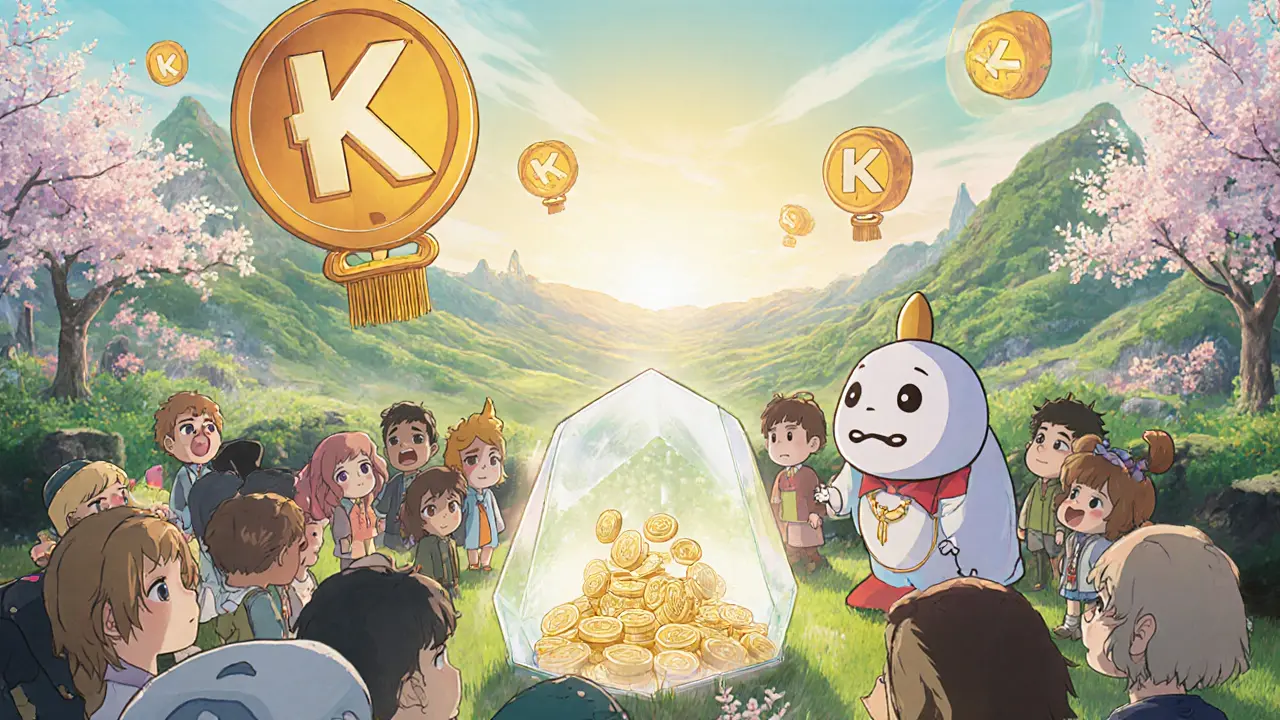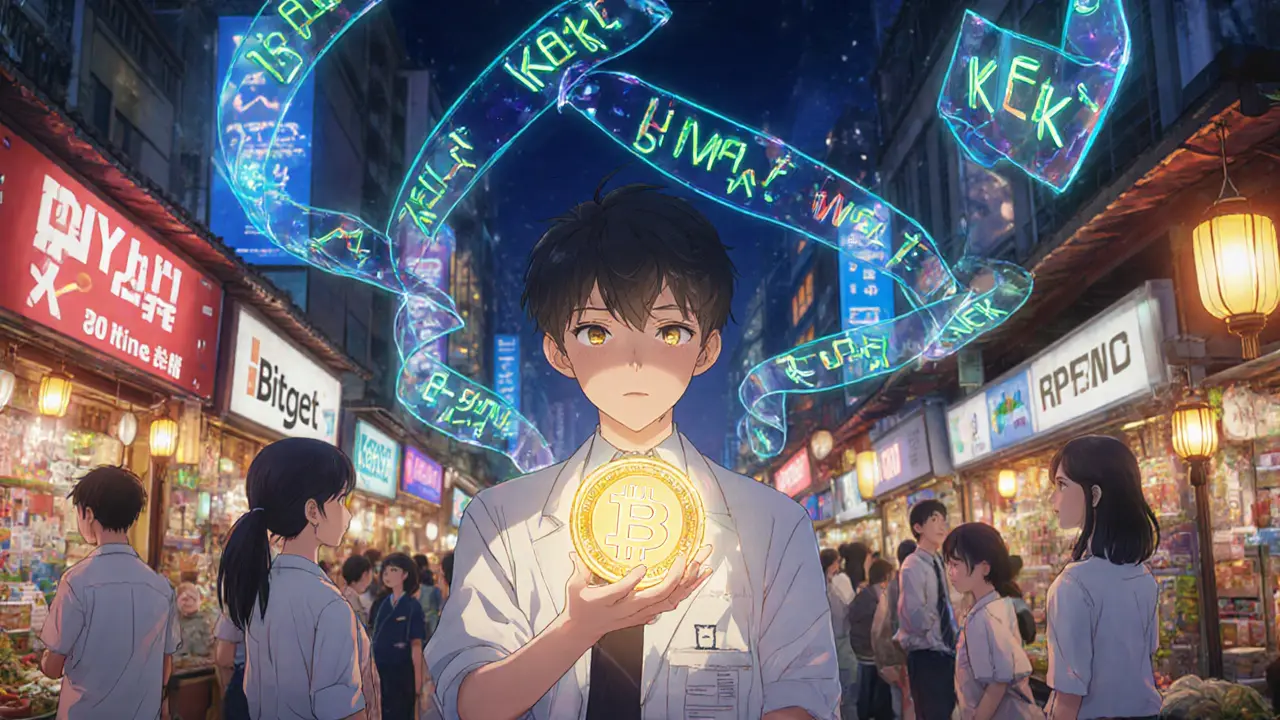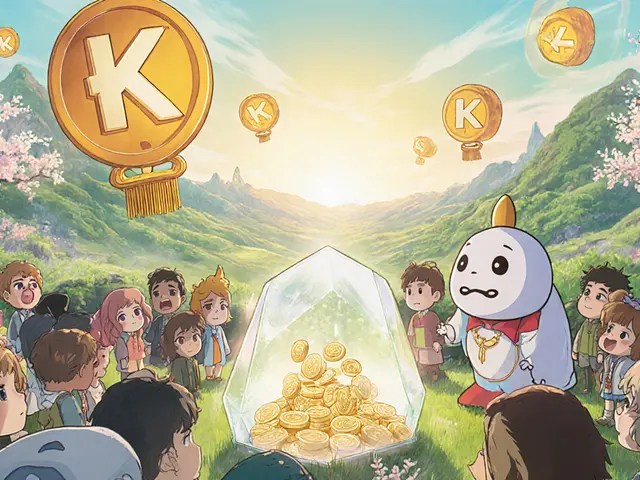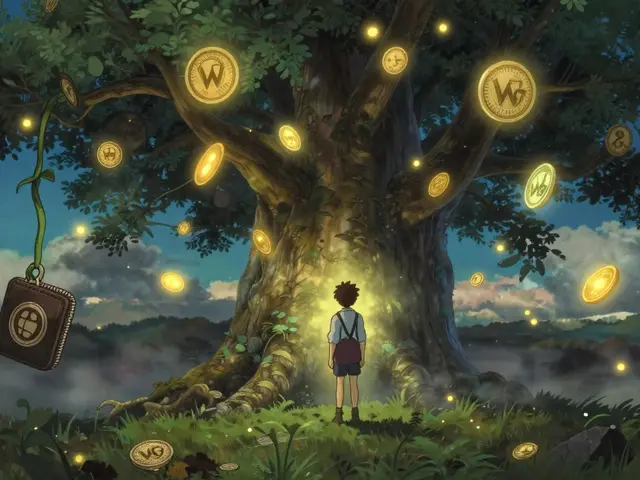14
What Is Kekistan (KEK) Crypto Coin? Explained

KEK Token Price Tracker
Kekistan (KEK)
Total Supply: 420.69 Billion
Price Simulation
Simulate how a price change might impact your investment:
Ever wondered why a token named after a fictional nation is popping up on crypto charts despite trading at less than a penny? That’s the story of Kekistan (KEK), a micro‑cap meme‑style cryptocurrency that aims to be a tradable asset on a handful of Asian exchanges. With a fixed supply of 420.69billion tokens, all of which are already circulating, KEK looks like any other low‑price token-except its community ties to internet culture, wildly volatile price swings, and limited liquidity make it a unique case study for anyone curious about the fringe of the crypto market.
Key Takeaways
- Kekistan (KEK) is a fully circulated micro‑cap token with a total supply of 420.69billion.
- Current market cap hovers around $3million, placing it near rank #8131 on major trackers.
- It’s listed on Bybit, Bitget, and MEXC, each requiring different KYC levels.
- Primary uses are arbitrage trading, staking/earning programs, and peer‑to‑peer payments.
- Volatility is extreme: hourly changes can reach+9.8% or‑0.8%.
What Exactly Is Kekistan?
At its core, Kekistan is a micro‑cap token that belongs to the broader family of meme or community cryptocurrencies. The name comes from a satirical nation created by internet users for jokes about “Kek,” a meme‑derived deity. Unlike Bitcoin or Ethereum-Bitcointhe first decentralized digital currency, created in 2009 and Ethereuma programmable blockchain platform that introduced smart contracts-KEK has no claimed breakthrough technology. Its value proposition is simply being tradable, scarce (fixed supply), and meme‑driven.
Supply, Circulation, and Price Snapshot
The token’s contract was minted with **420,690,000,000 KEK** and, according to exchange data, every single coin is already in circulation. No future minting is planned, which makes KEK a deflation‑friendly design; the supply will never inflate beyond that number.
Because the supply is massive, the price per coin stays in the micro‑dollar range. Recent quotes range from $0.00000548 on Bybit to $0.00000791 on Bitget. The all‑time high hit $0.00003536, roughly four to six times today’s levels, while daily movements swing between ‑8.23% and +7.39%.
Where Can You Trade KEK?
KEK is not on every major exchange, but it does appear on three platforms that actively promote Asian crypto traders:
| Exchange | KYC Required? | Typical 24h Volume | Special Features |
|---|---|---|---|
| Bybit | Level1 ID verification | $7.8K - $25K | Market & limit orders, fiat deposits |
| Bitget | Level1 ID verification | $10K - $30K | Learn2Earn, Assist2Earn, staking programs |
| MEXC | Optional verification (limited withdrawal limits) | $5K - $20K | Real‑time price alerts, low‑fee trading |
Liquidity is modest; 24‑hour trading volumes sit between $7,800 and $92,800 depending on the platform. That low volume explains why even small trades can move the price dramatically.

How Do People Use KEK?
Three main use cases appear across exchange listings:
- Arbitrage trading. The token’s price can differ by a few micro‑dollars between Bybit, Bitget, and MEXC. Traders buy on the cheaper platform and sell on the higher one, pocketing the spread.
- Staking and earning. Bitget’s “Earn” products let users lock KEK for a set period and earn a modest APY. The exact rate fluctuates with demand but usually stays under 10% annually.
- Payments & transfers. Because KEK uses a standard ERC‑20‑compatible contract, anyone can send it to another address for free (aside from blockchain gas). Real‑world adoption is scarce, but community members sometimes use it for charitable giveaways or to tip fellow meme‑coin enthusiasts.
Risk Profile and Why KEK Is Considered a Speculative Bet
Micro‑cap tokens like KEK carry a unique set of risks:
- Liquidity risk. Low trading volume means you may not be able to sell at the price you expect.
- Price volatility. Hourly shifts of up to +9.8% can reverse in minutes if a large holder sells.
- Community‑driven hype. Without a solid product roadmap, the token’s value relies heavily on memes, social media buzz, and occasional airdrops.
- Regulatory exposure. Exchanges require KYC, and any future crackdown on meme tokens could affect listings.
In short, treat KEK like a high‑risk, high‑reward gamble. Only invest money you can afford to lose.
How to Get Started (Step‑by‑Step)
- Create an account. Sign up on Bybit, Bitget, or MEXC. Complete Level1 KYC if you plan to trade sizable amounts.
- Deposit funds. Transfer fiat (where supported) or another crypto such as USDT to the exchange’s wallet.
- Find the KEK market. Search for the KEK/USDT pair; the ticker is usually “KEK”.
- Place an order. Use a limit order if you want a specific price, or a market order for instant execution.
- Consider staking. If you hold KEK longer than a day, explore Bitget Earn for passive returns.
- Monitor volatility. Set price alerts; a 5% move can happen within an hour.
Future Outlook - What Could Change?
At the moment, the project’s roadmap is vague. No official whitepaper, development team, or partnership announcements are publicly available. The token’s future therefore hinges on three factors:
- Community activity. A surge in meme‑driven social media posts can temporarily boost volume and price.
- Exchange support. If a larger exchange (e.g., Binance or KuCoin) adds KEK, liquidity could improve dramatically.
- Regulatory climate. Stricter rules around meme tokens might force exchanges to delist KEK, cutting off easy access.
Until one of those catalysts materializes, KEK will likely remain a niche, speculative asset with a market cap under $4million.
Frequently Asked Questions
What is the total supply of KEK?
The contract defines a fixed total supply of 420,690,000,000 KEK tokens, and all of them are already in circulation.
Where can I buy KEK?
KEK is listed on Bybit, Bitget, and MEXC. Each platform has its own KYC requirements and offers market or limit order trading.
Is KEK a good investment?
KEK is a high‑risk micro‑cap token. Its price is driven mainly by meme hype and low liquidity, so only allocate funds you can afford to lose.
Can I stake KEK for passive income?
Yes. Bitget’s Earn program lets you lock KEK for a set period and earn a modest APY, usually below 10%.
What are the main risks of holding KEK?
Key risks include low liquidity, extreme price volatility, reliance on community hype, and potential regulatory actions that could lead to delisting.

Bottom Line
If you’re intrigued by meme culture and enjoy rapid‑fire trading, KEK offers a playground for arbitrage and short‑term speculation. But remember: the token’s market cap is tiny, volume is thin, and the ecosystem lacks a real product roadmap. Treat it as a novelty investment rather than a long‑term store of value.





Lindsay Miller
October 14, 2024 AT 13:08Reading about KEK reminds me how many meme projects float in the market like balloons, bright but fragile. The risk of low liquidity means you could be left holding a token you can’t sell without taking a big loss. It’s good to think about why you’re drawn to the hype and whether the thrill matches the potential downside. If you decide to dabble, keep a clear exit plan and never risk money you can’t afford to lose.
Katrinka Scribner
October 16, 2024 AT 20:42OMG KEK is sooo wild 😂😂 i love the memey vibe but lol watch out for the crazy swings!! it's like riding a rollercoaster with your wallet strapped to your seat 🤪💸
VICKIE MALBRUE
October 19, 2024 AT 04:15Stay optimistic but keep it tiny.
Waynne Kilian
October 21, 2024 AT 11:48The community behind KEK feels oddly welcoming, like a small club sharing jokes and weird memes. Even with the occasional typo here and there, the vibe stays positive and many members help each other learn the ropes of micro‑cap trading. It’s a place where collaboration outweighs pure profit‑chasing.
Naomi Snelling
October 23, 2024 AT 19:22Honestly, meme tokens like KEK could be part of a larger agenda to distract investors while the real power structures tighten control. The lack of a real product and the reliance on jokes seem like a perfect smokescreen for a future crackdown.
Michael Wilkinson
October 26, 2024 AT 02:55While conspiracy theories are entertaining, the data simply shows KEK’s price movement is driven by thin order books and random social media spikes. Treat it like any other high‑risk asset and set firm stop‑losses.
Billy Krzemien
October 28, 2024 AT 09:28If you’re looking at arbitrage, keep an eye on the price gap between Bybit and MEXC. A modest $0.000001 difference can yield a decent profit when you move a few hundred thousand tokens. Remember to factor in withdrawal fees and the time it takes to transfer between exchanges; otherwise the spread may disappear before you lock in the trade.
april harper
October 30, 2024 AT 17:02KEK is the epitome of absurdity, a token that pretends to be a serious investment while dangling a meme flag. It’s lazily marketed, yet somehow it captures the imagination of those who love the spectacle of deflation‑driven hype.
Clint Barnett
November 2, 2024 AT 00:35Delving into the intricacies of KEK unveils a tapestry of micro‑cap dynamics that are both fascinating and cautionary. First, the sheer magnitude of its supply-420.690 billion tokens-means each unit trades at a fraction of a cent, inviting a breed of traders who thrive on volume rather than absolute value. Second, the token’s presence on three Asian‑focused exchanges-Bybit, Bitget, and MEXC-creates a fragmented liquidity landscape where price discrepancies are the norm rather than the exception. Third, the modest daily volume, often ranging between $8,000 and $90,000, amplifies the impact of relatively small trades, causing price swings that can eclipse ten percent within a single hour.
Fourth, the staking mechanisms offered by Bitget’s Earn program provide a veneer of utility, yet the APY rarely exceeds single‑digit percentages, underscoring that the primary lure remains speculative. Fifth, the community’s meme‑centric identity, rooted in the fictional nation of Kekistan, fuels periodic social media surges that temporarily inflate the token’s market cap, only to collapse once the buzz fades.
Sixth, the absence of a whitepaper or roadmap means investors have little insight into any long‑term strategic vision, relegating KEK to the realm of pure hype. Seventh, regulatory risk looms large; any jurisdiction that cracks down on meme coins could see KEK delisted from its already limited set of exchanges.
Eighth, the token’s ERC‑20 compatibility ensures seamless transfers, yet the underlying gas costs on the Ethereum network can erode profitability for smaller traders. Ninth, arbitrage opportunities are real but fleeting, demanding swift execution and a reliable bridge between platforms.
Tenth, the psychological profile of KEK holders often mirrors that of high‑risk gamblers, seeking quick thrills rather than sustainable growth. Eleventh, the token’s historical peak of $0.00003536 illustrates that dramatic upside is possible, but such peaks are typically short‑lived.
Twelfth, the community’s propensity for meme contests and giveaways serves as a double‑edged sword-driving engagement while fostering a culture of short‑term speculation. Thirteenth, the token’s price simulation tools, as described in the article, can be useful educational aids but should not be mistaken for predictive analytics.
Fourteenth, investors should meticulously assess the cost‑benefit of participating in KEK’s ecosystem, weighing the allure of meme culture against the stark realities of liquidity scarcity and volatility.
Finally, prudent participation involves allocating only a minuscule portion of one’s portfolio, employing strict risk‑management protocols, and maintaining an awareness that KEK, at its core, is a speculative novelty rather than a foundational financial instrument.
Jacob Anderson
November 4, 2024 AT 08:08Wow, a fifteen‑sentence manifesto about a meme coin-because nothing says "deep analysis" like a wall of text that no one will actually read.
Kate Nicholls
November 6, 2024 AT 15:42KEK’s price volatility is undeniable, yet the lack of genuine utility makes it hard to justify any long‑term hold. If you enjoy short‑term trading, it can be fun, but treat it as a side‑bet rather than a core asset.
Carl Robertson
November 8, 2024 AT 23:15Another “insightful” take on KEK, but let’s be real-the token’s only redeeming quality is its ability to stir drama in the chatrooms. The analysis feels like a rehash of the same points, and the tone borders on toxic.
Rajini N
November 11, 2024 AT 06:48For anyone interested in staking, Bitget’s Earn program currently offers an annual percentage yield around 7 %. To participate, simply lock your KEK tokens for the chosen period, and the platform distributes rewards in KEK. Keep in mind that early withdrawal may incur penalties, so plan your horizon accordingly.
Sidharth Praveen
November 13, 2024 AT 14:22Keeping a positive outlook can make the rollercoaster ride less stressful. Even if KEK dips, view each move as a learning experience and stay focused on the bigger picture.
Sophie Sturdevant
November 15, 2024 AT 21:55From a technical standpoint, KEK operates on an ERC‑20 standard, meaning gas fees on the Ethereum mainnet can significantly affect net returns, especially for micro‑transactions. Additionally, the token’s market cap hovers below $4 million, classifying it as a micro‑cap with inherent liquidity constraints.
Nathan Blades
November 18, 2024 AT 05:28Embrace the thrill of the chase, but remember that every trade carries a lesson. KEK’s wild swings can spark creativity in your strategy-think of it as a laboratory for rapid hypothesis testing. Stay disciplined, keep learning, and let the momentum propel you forward.
Somesh Nikam
November 20, 2024 AT 13:02Hey there 👋 If you’re just starting with KEK, focus on understanding the fee structure before you jump in. The token’s price can move fast, so using limit orders can protect you from unexpected slippage. Good luck!
Jan B.
November 22, 2024 AT 20:35Only allocate a small portion of your capital to meme tokens.
MARLIN RIVERA
November 25, 2024 AT 04:08KEK is nothing but a speculative gimmick with no real purpose, and its community hype is overrated.
Debby Haime
November 27, 2024 AT 11:42Stay energized and remember that every high‑risk trade is an opportunity to sharpen your skills. Even if KEK doesn’t soar, the experience you gain is valuable for future endeavors.